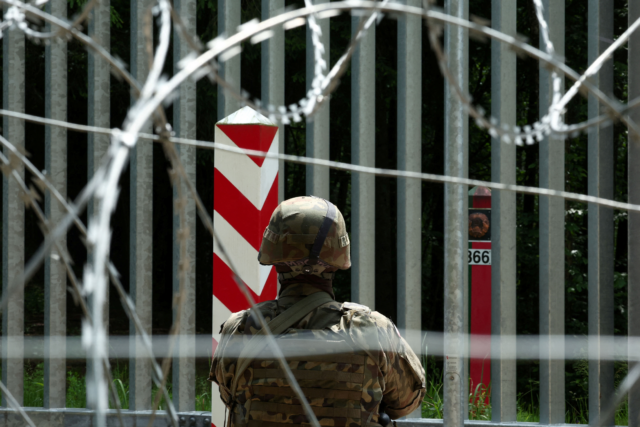
Migration will dominate the European Union summit on Thursday with Poland calling for an EU stance against Russia.
Diplomats said that Belarus will be using migrants as a weapon against the EU and others, urging sharper laws on sending back irregular arrivals.
Other topics on the agenda include leaders reiterating their unwavering support for Ukraine in its defence against Russia’s invasion.
EU diplomats said that leaders are also likely to call for a ceasefire and de-escalation of hostilities in the Middle East.
But the hottest discussion will be on how to deal with irregular migrants arriving in the 27-nation bloc by land from the east and by sea from the south.
Most EU governments see arrival of irregular migrants as a political and security risk.
Migration To Be A Major Point Of Discussion
“Migration will … be a major point of discussion,” the Chairman of the meeting Charles Michel wrote in an invitation letter to EU leaders.
“We will … focus on concrete measures to prevent irregular migration including strengthened control of our external
borders, enhanced partnerships and reinforced return policies,” he wrote.
Irregular migrants arriving in Europe last year numbered less than a third of the one million seen during the migration crisis in 2015.
In the first nine months of this year the number fell even more to 166,000, data from the EU’s Frontex border agency showed.
But the number of people arriving at the EU’s border with Belarus surged 192% year-on-year in January-September to 13,195.
The number of arrivals in the Spanish Canary islands off the western coast of Africa doubled to 30,616, Frontex said.
Diplomats noted that while the irregular arrivals were falling, public perception was different.
This was fuelled by outrage over incidents like the Solingen knife attack by an Islamic state perpetrator in Germany in August.
Migration Is Europe’s Top Political Issue
Migration has become one of the top political priorities in most EU countries, a senior EU diplomat said.
He added that right wing politicians framed events like Solingen as a failure of the immigration debate.
“It’s populist parties using fear to turn this issue into something that helps them, and the result is that in order to battle this perception, you actually need to do something,” the senior EU diplomat said.
Border Controls
Germany, wary of a public opinion backlash against irregular migration ahead of elections next September, has introduced
border controls with all its neighbours, suspending the freedom of the passport-free Schengen zone.
Border Checks
France, Denmark, Sweden, Austria, Italy and Slovenia have also introduced border checks.
Poland, which has presidential elections due in May, wants to temporarily suspend asylum rights for migrants crossing over from Russia-ally Belarus.
Many see this move as a violation of the EU’s charter of fundamental rights.
Warsaw says it draws its inspiration from Finland.
What Has Finland Done?
Finland, faced with migrants pushed across the border from Russia, suspended such asylum rights in July.
The EU agreed in May on a new set of rules and processes for handling migration, called the Migration Pact.
Its full implementation however is not due until mid-2026, leaving the bloc in a complicated transition period.
Further complicating matters, the Migration Pact has no instruments to deal with the “weaponisation” of migration by countries like Russia.
The Pact does not solve the thorny issue of sending back migrants whose asylum applications have been rejected.
In a policy U-turn from previous years, the European Commission said this week it would propose that migrants who have no right to stay in the EU be sent to “return hubs” in countries outside the EU.
(With inputs from Reuters)
Delhi based journalist pickled in journalism. Have reported from nine world capitals and almost all parts of India. Over the last three decades, I have worked for India’s mainstream English dailies and contributed to All India Radio, Doordarshan and Women’s Feature Service. Also worked for international media including Japan’s leading newspaper, The Asahi Shimbun and done assignments for The Sunday Times, London, The Telegraph, The Guardian and the Canadian Broadcasting Corporation. Worked in the Embassy of France in New Delhi and can speak French to save my life. Write on Diplomacy, Politics and the social sector. Love Nature, heritage, Nature, animals and vintage cars. Enjoy cycling and playing badminton.




